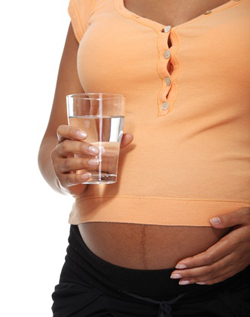Swelling problems during pregnancy

Swelling during pregnancy is certainly a normal and expected event, and takes place as part of the birth preparation.
You’ll notice that parts of your body, such as ankles, feet, legs, hands and face, can swell and blow up during pregnancy. In fact, 75 per cent of expecting women have edema at one point or another. It often occurs when you stay in the same position for too long and is more common during the third trimester.
Explanation
Water represents 60 per cent of your body. It’s in your cells, blood, skin, organs and muscles. Your vessels filter more than 20 litres of water daily and then reabsorb it in specific areas of your body.
During pregnancy, the body produces approximately 50 per cent more blood and body fluids to meet the needs of the developing baby. The heart rate also increases by 10 to 15 per cent. The extra retention of fluid is needed to soften the body, enabling it to expand as the baby develops. Extra fluid also helps prepare the pelvic joints and tissues to open to allow the baby to be born.
The extra fluids account for approximately 25 per cent of the weight women gain during pregnancy.
Also, your growing uterus is putting pressure on your veins, which impairs return of blood to your heart. In turn, this leads to swelling in the legs, ankles and feet and could cause varicose veins. Good posture and positioning (using a few pillows when you sleep on your back, for example) can help prevent this vein compression.
Prevention
To prevent swelling, try to:
• Minimize caffeine intake because it can lead to dehydration.
• Minimize sodium and sugar intake.
• Rest with your feet elevated.
• Wear comfortable shoes, avoiding high heels if possible.
• Wear supportive tights or stockings.
• Avoid clothes that are tight around your wrists or ankles.
• Get adequate exercise, to aid in circulation.
• Drink a lot of water, which helps flush toxins and reduce water retention.
• Avoid standing for long periods.
• In summertime heat, stay cool. Spend time in the swimming pool, or in air-conditioned places.
• Sleep in a semi-sitting position.
• Sleep on your side (left one preferably) to promote kidney function.
Other alternatives
Alternative methods can help reduce or prevent swelling. Massages can help with blood and lymphatic circulation. Make sure to choose a trained professional.
Although edema is common, it is recommended to visit a doctor if the swelling persists and is accompanied by high blood pressure, strong headaches or troubled vision.
Courtesy of: MotherForLife.com




